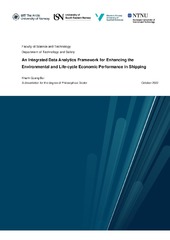| dc.contributor.advisor | Perera, Lokukaluge Prasad Channa | |
| dc.contributor.author | Bui, Khanh Quang | |
| dc.date.accessioned | 2023-02-22T10:50:44Z | |
| dc.date.available | 2023-02-22T10:50:44Z | |
| dc.date.embargoEndDate | 2028-03-03 | |
| dc.date.issued | 2023-03-03 | |
| dc.description.abstract | <p>Shipping has been recognized as the most efficient mode of transport, carrying over 80% of international trade volume. The shipping industry is at the beginning of one of its greatest energy and technology transition driven by decarbonization drivers in terms of stringent emission regulations and commercial pressure. Digitalization can enable the transition by leveraging Machine Learning (ML) and Data Analytics (DA) techniques with a focus on enhancing energy efficiency during ship operations. Furthermore, such a transition is expected to exert tremendous impacts on the life-cycle costs of ships’ assets and systems. Under the scope of maritime decarbonization, the main aim of this thesis is to develop an integrated data analytics framework for enhancing the environmental and life-cycle economic performance in the shipping industry. In order to achieve the stated aim, a set of objectives are specified under two distinct frameworks which are developed in individual methodologies and applied in unique case studies illustrating their effectiveness in the respective objectives.
<p>Firstly, an advanced data analytics framework (ADAF) is proposed to quantify the operational performance of a bulk carrier on a local scale with respect to its operational conditions. The ADAF includes appropriate data analytics along with domain knowledge for the detection of data anomalies, the investigation of the ship’s localized operational conditions via data clustering, the identification of the relative correlations among the investigated parameters and the quantification of the ship’s performance in each of the respective conditions (i.e., engine modes and trim-draft modes). Given the data set used for the implementation of the ADAF, a ship performance index (SPI) is derived to find the best performance trim-draft mode under the engine modes of the ship. The findings generated from the ADAF add to the growing field of fault diagnostics, ship performance and condition monitoring in the maritime research domain and are particularly relevant for ship-owners and ship operators.
<p>Secondly, a life-cycle cost framework (LCCF) is developed to evaluate the total cost performance of an innovative marine dual-fuel engine compared to that of a conventional diesel engine. The LCCF is built upon the fundamental assumption that the selected ship from the ADAF will be retrofitted with the dual-fuel engine. The LCCF includes the development of a cost model with an engineering build-up approach considering the uncertainties involved over the lifetime of such engines, resulting in interpretable and effective results using data from numerous sources. Furthermore, and the Saving-to-Investment Ratio (SIR) are derived from the LCCF to compare the life-cycle cost performances of these engines. The findings indicate that the dual-fuel engine is more cost-effective than the diesel engine under a given fuel price scenario. The uncertainties are meticulously treated by performing scenario sensitivity analyses and a Monte Carlo simulation. Results from the scenario sensitivity analyses indicate that the cost-effectiveness of the dual-fuel engine is sensitive to higher gas price scenarios. Results from the Monte Carlo simulation within the initial fuel price setting reveal an adequate degree of confidence when opting for the dual-fuel engine. Furthermore, it is found that fuel prices are the most influential cost driver. Different foreseeable carbon pricing scenarios are also simulated to show that the dual-fuel engine is still more competitive than the diesel engine. One of the more significant findings is that regardless of fuel price and carbon pricing scenarios, the dual-fuel engine offers an environmental impact (EI) with a CO2 emission reduction potential of 33% compared to the diesel engine. The findings contribute to the current literature on shipping investment appraisals. Furthermore, the findings could be of interest to ship-owners and investors wishing to make retrofitting decisions. The findings also have policy implications for the development of market-based measures (MBMs) for emissions reduction in shipping achieved through future energy technologies.
<p>Taken together, this thesis marks the first attempt to develop an integrated data analytics framework encompassing ML/DA approaches and the life-cycle cost approach with the creation of various KPIs (i.e. Key Performance Indicators) including the SPI, NPC, NS, SIR and EI to enable better decision-making towards enhanced environmental and life-cycle economic performance in the shipping industry. | en_US |
| dc.description.doctoraltype | ph.d. | en_US |
| dc.description.popularabstract | Shipping has been recognized as the most efficient mode of transport, carrying over 80% of international trade volume. The shipping industry is at the beginning of one of its greatest energy and technology transition driven by decarbonization drivers in terms of stringent emission regulations and commercial pressure. Digitalization can enable the transition by leveraging Machine Learning (ML) and Data Analytics (DA) techniques with a focus on enhancing energy efficiency during ship operations. Furthermore, such a transition is expected to exert tremendous impacts on the life-cycle costs of ships' assets and systems. Under the scope of maritime decarbonization, the main aim of this thesis is to develop an integrated data analytics framework for enhancing the environmental and life-cycle economic performance in the shipping industry. In order to achieve the stated aim, a set of objectives are specified under two distinct frameworks which are developed in individual methodologies and applied in unique case studies illustrating their effectiveness in the respective objectives.
Firstly, an advanced data analytics framework (ADAF) is proposed to quantify the operational performance of a bulk carrier on a local scale with respect to its operational conditions. The ADAF includes appropriate data analytics along with domain knowledge for the detection of data anomalies, the investigation of the ship’s localized operational conditions via data clustering, the identification of the relative correlations among the investigated parameters and the quantification of the ship’s performance in each of the respective conditions (i.e., engine modes and trim-draft modes). Given the data set used for the implementation of the ADAF, a ship performance index (SPI) is derived to find the best performance trim-draft mode under the engine modes of the ship. The findings generated from the ADAF add to the growing field of fault diagnostics, ship performance and condition monitoring in the maritime research domain and are particularly relevant for ship-owners and ship operators.
Secondly, a life-cycle cost framework (LCCF) is developed to evaluate the total cost performance of an innovative marine dual-fuel engine compared to that of a conventional diesel engine. The LCCF is built upon the fundamental assumption that the selected ship from the ADAF will be retrofitted with the dual-fuel engine. The LCCF includes the development of a cost model with an engineering build-up approach considering the uncertainties involved over the lifetime of such engines, resulting in interpretable and effective results using data from numerous sources. Furthermore, several measures of economic performance such as the Net Present Cost (NPC), the Net Saving (NS) and the Saving-to-Investment Ratio (SIR) are derived from the LCCF to compare the life-cycle cost performances of these engines. The findings indicate that the dual-fuel engine is more cost-effective than the diesel engine under a given fuel price scenario. The uncertainties are meticulously treated by performing scenario sensitivity analyses and a Monte Carlo simulation. Results from the scenario sensitivity analyses indicate that the cost-effectiveness of the dual-fuel engine is sensitive to higher gas price scenarios. Results from the Monte Carlo simulation within the initial fuel price setting reveal an adequate degree of confidence when opting for the dual-fuel engine. Furthermore, it is found that fuel prices are the most influential cost driver. Different foreseeable carbon pricing scenarios are also simulated to show that the dual-fuel engine is still more competitive than the diesel engine. One of the more significant findings is that regardless of fuel price and carbon pricing scenarios, the dual-fuel engine offers an environmental impact (EI) with a CO2 emission reduction potential of 33% compared to the diesel engine. The findings contribute to the current literature on shipping investment appraisals. Furthermore, the findings could be of interest to ship-owners and investors wishing to make retrofitting decisions. The findings also have policy implications for the development of market-based measures (MBMs) for emissions reduction in shipping achieved through future energy technologies.
Taken together, this thesis marks the first attempt to develop an integrated data analytics framework encompassing ML/DA approaches and the life-cycle cost approach with the creation of various KPIs (i.e. Key Performance Indicators) including the SPI, NPC, NS, SIR and EI to enable better decision-making towards enhanced environmental and life-cycle economic performance in the shipping industry. | en_US |
| dc.description.sponsorship | Ministry of Education and Research - Kunnskapsdepartementet (KD) | en_US |
| dc.identifier.isbn | 978-82-8236-512-3 (trykt), 978-82-8236-513-0 (pdf) | |
| dc.identifier.uri | https://hdl.handle.net/10037/28590 | |
| dc.language.iso | eng | en_US |
| dc.publisher | UiT Norges arktiske universitet | en_US |
| dc.publisher | UiT The Arctic University of Norway | en_US |
| dc.relation.haspart | <p>Paper I: Bui, K.Q. & Perera, L.P. (2020). A Decision Support Framework for Cost-Effective and Energy-Efficient Shipping. <i>Proceedings of the ASME 2020 39th International Conference on Ocean, Offshore and Arctic Engineering. Volume 6A: Ocean Engineering</i>. Virtual, Online. August 3–7, 2020. V06AT06A026. ASME. Published version not available in Munin due to publisher’s restrictions. Published version available at <a href=https://doi.org/10.1115/OMAE2020-18368>https://doi.org/10.1115/OMAE2020-18368</a>.
<p>Paper II: Bui, K.Q. & Perera, L.P. (2021). Advanced data analytics for ship performance monitoring under localized operational conditions. <i>Ocean Engineering, 235</i>, 109392. Also available in Munin at <a href=https://hdl.handle.net/10037/21948>https://hdl.handle.net/10037/21948</a>.
<p>Paper III: Bui, K.Q., Perera, L.P., Emblemsvåg, J. & Schøyen, H. (2022). Life-Cycle Cost Analysis on a Marine Engine Innovation for Retrofit: A Comparative Study. <i>Proceedings of the ASME 2022 41st International Conference on Ocean, Offshore and Arctic Engineering. Volume 5A: Ocean Engineering</i>. Hamburg, Germany. June 5–10, 2022. V05AT06A029. ASME. Published version not available in Munin due to publisher’s restrictions. Published version available at <a href=https://doi.org/10.1115/OMAE2022-79488>https://doi.org/10.1115/OMAE2022-79488</a>.
<p>Paper IV: Bui, K.Q., Perera, L.P. & Emblemsvåg, J. (2022). Life cycle cost analysis of an innovative marine dual-fuel engine under uncertainties. <i>Journal of Cleaner Production, 380</i>, 134847. Also available in Munin at <a href=https://hdl.handle.net/10037/28216>https://hdl.handle.net/10037/28216</a>. | en_US |
| dc.rights.accessRights | embargoedAccess | en_US |
| dc.rights.holder | Copyright 2023 The Author(s) | |
| dc.rights.uri | https://creativecommons.org/licenses/by-nc-sa/4.0 | en_US |
| dc.rights | Attribution-NonCommercial-ShareAlike 4.0 International (CC BY-NC-SA 4.0) | en_US |
| dc.subject | VDP::Technology: 500::Marine technology: 580 | en_US |
| dc.subject | VDP::Teknologi: 500::Marin teknologi: 580 | en_US |
| dc.title | An Integrated Data Analytics Framework for Enhancing the Environmental and Life-cycle Economic Performance in Shipping | en_US |
| dc.type | Doctoral thesis | en_US |
| dc.type | Doktorgradsavhandling | en_US |


 English
English norsk
norsk

